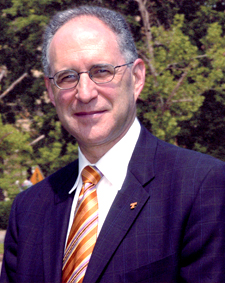 The retention rate for first-time, full-time freshmen who began classes at UT Knoxville in fall 2006 is 84 percent. That’s an improvement over the past rate of 81.7 percent and rates that hovered between 75 percent and 80 percent for the decade prior to 2006.
The retention rate for first-time, full-time freshmen who began classes at UT Knoxville in fall 2006 is 84 percent. That’s an improvement over the past rate of 81.7 percent and rates that hovered between 75 percent and 80 percent for the decade prior to 2006.
The new figures are being announced at the same time UT Knoxville officials are outlining plans for continued efforts to boost the retention rate.
"Retention is one of the primary measures of institutional success. The best public universities have high retention rates, and we aspire to be counted among them. High retention rates are also a sign that a campus is doing a good job educating its students," said UT Provost Bob Holub, who has made retention one of his priorities.
A Retention Task Force, commissioned by Holub in December 2006, recently issued its report.
The group reviewed research and looked at local and national data. The group then set two major goals: 1) Improve UT’s first-to-second-year retention rate to the level of our Tennessee Higher Education Commission peer institutions; and 2) Improve the quality of the undergraduate experience at UTK.
Retention-boosting plans outlined in the report include creating a Tennessee Teaching Learning Center to help faculty members in communicative strategies and best practices in the classroom; improving academic advising; and more fully integrating undergraduate research into the curriculum.
These new plans will build on retention-boosting strategies — including a host of new Welcome Week activities — that already have started.
This fall, freshmen were encouraged to sign up for one-credit First Year Studies seminars — ranging from "Football Physics" to "Understanding Obesity" to "Your Memory: How It Works and How to Improve It."
"These seminars bring students together with faculty members in their initial year, which will introduce them to the excitement of learning in higher education," Holub said. "The seminars will provide a counter to the large lecture courses in which most students have to enroll, and facilitate student contact with tenured and tenure-track faculty members in their initial year at UT."
Also during this fall’s Welcome Week, students were encouraged to attend college open houses and earn "passport" stamps — redeemable for prizes — for finding their classrooms prior to the start of classes.
Meanwhile, the Student Success Center now requires at-risk students to attend academic success workshops and offers student-led study groups in courses that historically have proven challenging for first-year students.
Those activities were launched, in part, to address issues pinpointed by the Student Success Center, which partnered with University Housing in December 2006 to administer an exit survey to first-year students leaving the university. The top three reasons students gave for leaving: "UTK is too large and impersonal"; "I had trouble adjusting personally to UTK"; and "I did not feel like I fit in at UTK."
Ruth Darling, assistant vice provost, chair of the Retention Task Force and director of the Student Success Center, said those finding have guided UT’s efforts thus far — and will continue to help administrators create retention-boosting programs.
"We must think small," she said. "We must create programs to address students’ successful integration into UT’s various academic and social communities. Students want to ‘fit in’ and interact in meaningful ways with peers, faculty, staff and the campus environment."